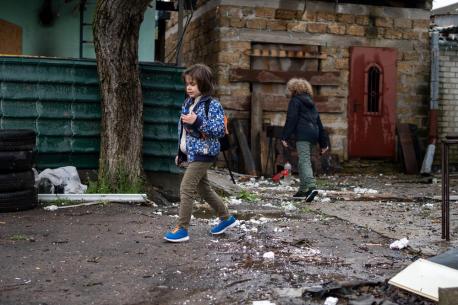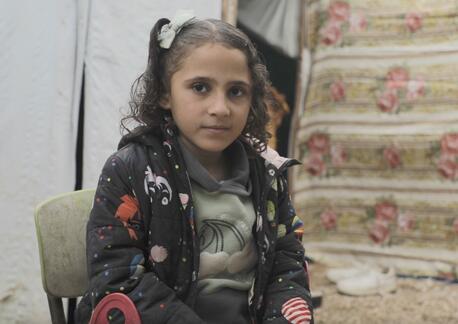
After Dam Attack, Families Brace for Flooding in Kherson, Ukraine
Families are preparing emergency go bags and stocking up on water following the collapse of the Kakhovka dam in southern Ukraine.
When news of the explosion at the Kakhovka hydroelectric power plant and the resultant flooding in parts of Kherson broke on June 6, Yevheniya, a mother of three children — 11-year-old Timofy, 10-year-old Yehor and 8-year-old Glib — said she had the same horrible feeling just as she did when the war escalated in February last year. Once again, she was forced to make contingency plans for the safety of her children and stock up on drinking water. "It reminds me of the start of the war, when you don't know what to expect," she said.
Throughout the morning, the family collected water in every available container, as the water supply to Kherson city has been cut by the attack on the dam.

"The house is now completely filled with water containers. But it's uncertain if these supplies will be enough for us," Yevheniya said. "Our water has already been shut off. And we're afraid they will also cut off the electricity because there have been warnings about that too. We experienced this during active shelling, when my children and I spent a month without water and electricity. It's very difficult to go through it again, especially for the children in summer."

Another Yevheniya from Kherson, a mother of five children, had planned to take her children to a therapist at the UNICEF Spilno Child Spot on June 7, but following the attack on the dam those plans are on hold.
"We want our children to have the opportunity to communicate with other children and have a peaceful life. But now we're afraid to go into the city center again because of the intensified shelling and flooding," she added.

Yevheniya's husband works as a bus driver and has already carried out several humanitarian trips today to evacuate people from flooded parts of the city.
UNICEF is working on the ground in affected areas, providing essential supplies such as water bottles, hygiene kits, and children’s kits to people from affected areas in Kherson and Mykolaiv Oblasts, particularly people who have been forced to relocate. Additionally, cash support will be provided to families with children in the districts affected by flooding.
Learn more about UNICEF’s Ukraine and Refugee Response 2023 Appeal, which contains details about UNICEF's strategy and plans to meet immediate and long-term needs of 9.4 million people, including 4 million children.
UNICEF continues to stay and deliver for the people of Ukraine — and remains committed to working with partners to support children and families through the war and beyond.
Support UNICEF's emergency response efforts in Ukraine and around the world. Your contribution can make a difference. Please donate today.
HOW TO HELP
There are many ways to make a difference
War, famine, poverty, natural disasters — threats to the world's children keep coming. But UNICEF won't stop working to keep children healthy and safe.
UNICEF works in over 190 countries and territories — more places than any other children's organization. UNICEF has the world's largest humanitarian warehouse and, when disaster strikes, can get supplies almost anywhere within 72 hours. Constantly innovating, always advocating for a better world for children, UNICEF works to ensure that every child can grow up healthy, educated, protected and respected.
Would you like to help give all children the opportunity to reach their full potential? There are many ways to get involved.





